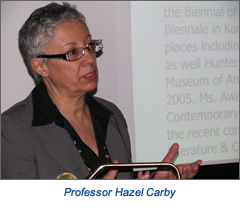
A symposium entitled, “What is Caribbean Studies: Prisms, Paradigms, and Practices,” organized by Professors Hazel Carby, Kamari Clarke and David Scott, was held at the Whitney Humanities Center on April 1-2, bringing together scholars and students in the field from around the country and beyond.
The symposium posed the following questions: “What constitutes the Caribbean in Caribbean Studies?” “To what extent do the divergent locations, subjectivities, and traumas captured by the term ‘Caribbean’ actually render a fixed notion of the Caribbean impossible?” “What is gained or missed by applying concepts such as empire, transnationalism, globalization, and neoliberalism to the locations historically imagined as the Caribbean?” In answering these questions, the symposium focused on the national and transnational networks and linkages that have come to constitute the Caribbean beyond its geography and its political and subject formations. In her opening remarks, Professor Hazel Carby, Professor of African American Studies and American Studies, and Director of Yale’s Initiative on Race, Gender and Globalization, said, “The Caribbean is an area that Yale didn’t know where it was,” but its resources were considered somewhere between Latin America and British Commonwealth. “Over the past two years, we’ve worked very hard to identify what [resources] Yale has, and what Yale needs.”
Professor Carby introduced the symposium’s keynote speaker, David Scott, Professor of Anthropology at Columbia University, who lectured on “The Question of Caribbean Studies.” He urged his listeners “to be concerned less with the substantive details of our individual research than with how this work allows us to think and rethink Caribbean studies as a conceptual, ideological, political, and moral question.”
Scott traced the development of the subject from a 1955 essay by Jamaican M.G. Smith in the journal, Caribbean Affairs, called “A Framework for Caribbean Studies.” He noted that Smith was inaugurating a moment in Caribbean intellectual history, because previously most of the research had been done by American or British researchers.
Then he turned to “another moment” 20 years later – the publication in 1975 of Edward Kamau Brathwaite’s essay entitled, “Caribbean Man in Space and Time.” In the early 1960s, Scott said, the economists Lloyd Best and George Beckford “were developing an innovative social science language in which to capture the continuing nature of economic dependence within neocolonial sovereignty. ‘Caribbean Man in Space and Time,’ then, is Brathwaite’s lyrical response to both Smith’s pluralism and Best and Beckford’s plantation theory.”
He said another turning point was the expulsion of Walter Rodney from Jamaica in 1968, which “marks a critical turning point in the development of BC and left political movements in the region,” because it highlighted culture “as a domain of power and struggle.”
Scott said Smith’s theory of pluralism and Brathwaite’s theory of Creolization “do not exhaust the range of theoretical debates about what the Caribbean is, or ought [to be],” adding that the Caribbean they described of the 1950s and the 1970s is not the same as the Caribbean of today, from which vantage point “they might be read as but competing sides of a single coin, whose presumed currency is that of sovereignty or, more properly, the sovereign nature state.” In her closing remarks, Kamari Clarke, Professor of Anthropology at Yale, further reiterated the importance of “understanding the Caribbean as both a locus of practices and a place for the making of locality.”
“The conference was a tremendous success – the rooms in the Whitney Humanities Center were packed, and the audience was drawn from a wide range of interest in the Caribbean,” Professor Carby said, adding that plans are in the works to publish the conference papers in a special issue of Small Axe, a Caribbean journal of criticism.
